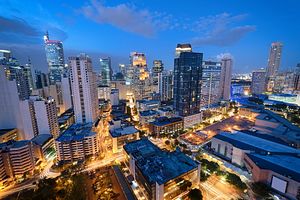No longer the “sick man of Asia,” the Philippines has embarked on presidential elections in its best economic position for decades. Can the next president continue the recent strong performance?
Philippine President Benigno Aquino will step down in June 2016 with the Southeast Asian nation having outperformed many of its regional peers. Real gross domestic product (GDP) expanded by 6.1 percent in 2014, driven by higher household consumption, private construction and exports. The International Monetary Fund (IMF) expects GDP growth to reach 6.2 percent this year and 6.5 percent in 2016, with the nation having posted 6.6 percent average annual growth since 2012, its fastest pace since the 1970s.
Importantly given the capital flight pressures on emerging economies, the country’s external and fiscal positions have strengthened under Aquino. In 2014, the nation posted a current account surplus of 4.4 percent of GDP, with gross international reserves of nearly $80 billion, a national government deficit of just 0.6 percent of GDP, and general government debt at 36 percent of GDP.
The world’s 39th largest economy also achieved its first investment grade credit rating under Aquino’s watch, from Fitch Rating in 2013, while Moody’s and Standard and Poor’s currently rate its debt two notches above investment grade.
Aquino’s moves to clean up corruption, highlighted by the historic impeachment of the Supreme Court Chief Justice and incarceration of former President Gloria Arroyo, have been praised by analysts. According to Transparency International, the nation has posted the biggest improvement compared to its regional peers in the corruption perception index, rising to 85 of 175 countries in 2014 compared to 134 of 178 nations in 2010.
However it has not been all plain sailing for Aquino, with his image as a poster boy of clean governance damaged by a 2013 scandal over his disbursement allocation program. The World Bank also recently lowered its “ease of doing business” rating for the Philippines to 95th in 2015, down nine spots from the previous year, with the nation scoring particularly low on starting a business (161st), protecting minority investors (154th) and paying taxes (127th).
The Economist Intelligence Unit (EIU) has also described the Philippines as being “marked by wide inequalities of income” with the gap between rich and poor remaining acute. In 2014, GDP per capita was estimated at below $3,000, and the EIU expects this will only rise to around $4,500 by 2019.
“Aquino has been a good president following on from a fairly good president before, but there’s always the risk in the Philippines that you will get a bad president coming through and the gains of the last decade will be lost,” the EIU’s Duncan Innes-Ker said in a July 29 presentation.
While describing the nation as a recent “star performer” based on its demographic dividend of a young population and economic gains from industries such as business offshoring, Ker warned of the potential for delays to planned investments due to regulations or corruption, along with the continuing insurgency on the southern island of Mindanao, known as the nation’s food basket.
According to the Asian Development Bank, the Philippines should see stronger growth in 2016 on a pickup in government spending and a bounce back in exports, but it faces the threat of softer growth in the major industrial economies and China, as well as the potential impact of a severe El Nino weather system that could hurt rural incomes and hike food, water and electricity prices.
However, ANZ Research argues that the next president will inherit an economy that has been strengthening since 2010, aided by a rising GDP growth rate, a flourishing outsourcing sector, rising investment growth and declining government debt.
“Regardless of who wins the presidential elections in May 2016, we believe the Philippines is well-positioned to maintain its growth momentum and outperform its regional peers, even amid fears of China’s slowdown,” ANZ economist Eugenia F. Victorino said in an October 23 report.
According to ANZ, the nation’s potential growth rate has now expanded to above 6.5 percent, aided by growing business and consumer confidence. This compared to the previous president, where business confidence fell into negative territory, although the Australian bank credited Arroyo with supporting the growth of the outsourcing industry through tax incentives.
Although this year’s overall budget deficit may miss the government’s target of 2 percent of GDP, ANZ said Aquino would gift his successor with “healthy government balance sheets,” having cut public debt from 60 percent to 48 percent of GDP.
Celebrities to Alien-Backed Candidates
A large field of 130 candidates have nominated for the top job, including sports stars, actors, political dynasties and even an alien-backed candidate, indicating the healthy state of democracy in the Philippines.
According to Bloomberg News, three main contenders have emerged, comprising former Interior Secretary Mar Roxas, representing the ruling Liberal Party; Vice President Jejomar Binay, ex-mayor of the nation’s key business district of Makati City; and first-term senator Grace Poe, daughter of one of the nation’s most revered film stars, who is running as an independent.
Among the diverse nominees are several who have claimed “divine powers,” while one candidate, Allan Carreon has even claimed to have backing from an alien. In addition, a number have links to political dynasties, including Binay, while celebrity candidates include boxer Manny Pacquiao.
Winning the youth vote will be key, given young voters aged between 18 to 34 account for around 40 percent of the 50 million eligible voters.
But while the next president will face defense risks including domestic and external threats, and the threat of a trade recession crimping exports, the economy should not make the top of the to-do list for Asia’s rising star.

































